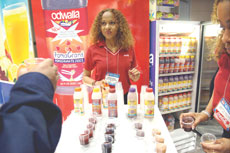 MCT Campus
MCT CampusWASHINGTON – Drink Snapple Rain because it “provides your body with refreshment, energy and rejuvenation.” With Tazo Lemon Green iced tea, “You may achieve a higher level of consciousness.” Arizona Black Tea with Ginseng will “help increase vitality and promote general good health.”
Or so the labels on these bottles claim.
There is a growing market in the United States for a set of specialty foods, known as “functional” foods, that make vague claims of promoting physical or emotional well-being beyond basic nutrition.
But as critics complain that the claims made for these products are overblown, at best, federal officials are chewing on a proposal to regulate them more strictly.
At the urging of health officials and consumers, the Food and Drug Administration plans to hold a public meeting on Dec. 5 to discuss the regulations governing the testing and labeling of functional foods.
Fueled by increasing consumer demand, the market for these foods has exploded in recent years, with annual sales expected to reach $49 billion by 2010.
Some of the foods are recognized for their benefits, such as soy protein or calcium-fortified orange juice, but many contain ingredients that have not undergone federal testing. And because the foods have been subject to little regulation, their labels often suggest fantastic health benefits, sometimes bordering on the spiritual.
“We’re concerned that all the hoopla surrounding so-called functional foods will distract from sound dietary advice,” said Bruce Silverglade, director of legal affairs for the Center for Science in the Public Interest in Washington.
The center, which often spars with the food and beverage industries, sent a petition to the FDA in 2002 asking the agency to begin prohibiting products from making claims that have not been approved by the FDA. The agency cited that petition last month as one impetus for scheduling the December meeting.
The FDA has no formal definition for functional foods, which are currently regulated under one umbrella act governing all conventional foods. The vaguely defined category of functional foods includes some dietary supplements, which have also been difficult for the FDA to regulate.
Fergus Clydesdale, head of the Department of Food Science at the University of Massachusetts, Amherst, said costs and regulatory restrictions provide motivation for manufacturers to make less qualified and potentially less accurate claims.
As an official FDA classification, “Health Claims,” which are those that say a product may reduce the risk of a particular disease, must undergo strict testing procedures and obtain FDA approval. And since health claims require these expensive studies, Clydesdale said, manufacturers often prefer to make a generic assertion on a product’s effectiveness.
Currently, only about a dozen foods have been approved by the FDA to make qualified health claims. For example, oat manufacturers can legally say their product “may reduce the risk of heart disease” because oats are one of the few foods to have undergone testing and received FDA approval.
But when Odwalla makes the unregulated assertion that the herbs echinacea and astragalus in its Wellness drink have been “used for centuries to fortify the immune system,” the FDA cannot prevent the claim because it does not refer to a specific disease.
Wendy Reinhardt Kapsak, director of health and nutrition for the Washington-based International Food Information Council Foundation, an industry-backed group, said manufacturers have an incentive to avoid health claims because “structure-function” claims, which don’t require FDA approval, resonate more with consumers.
Health claims focus on disease, she said, while structure-function claims promote general well-being, and because average consumers don’t differentiate between the types of claims, they gravitate toward the more positive-and less regulated-claims.
“A lot of consumers don’t want to see the word ‘cancer’ on a product,” said Reinhardt Kapsak. referring to products that claim to reduce the risk of certain types of cancer. “Positive messages resonate best with consumers.”









